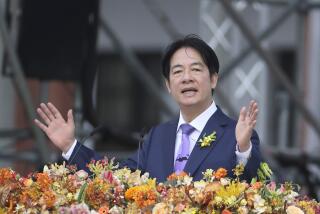Tensions Send More Taiwan Money to U.S.
- Share via
China’s stepped-up military threats against Taiwan in the last week have led to a sharp increase in the transfer of money from Taiwan to Southern California banks, put transpacific business deals on hold and prompted a rush to book flights from Taiwan to the United States.
“I think a lot of people are nervous,” said Nannen Xu, a senior advisor at Far East National Bank in Los Angeles.
In an effort to allay fears, the Taiwanese government has dipped into its foreign reserves, among the largest in the world, to keep the Taiwan dollar above the $27.50 mark. The government also released an emergency plan Monday designed to keep vital industries operating in the event of war.
Many Taiwanese and foreign banks were forced Monday to put limits on the sale of U.S. bank notes of $1,000 to $3,000 a day, after running out of the coveted currency.
It is too early to measure exactly how much economic damage has been done. The battered Taiwanese stock market fell an additional 2% on Monday, bringing it down a total of 30% since China first launched missile tests near Taiwan in July.
Most observers remain convinced that the Chinese government is merely trying to intimidate the Taiwanese people in the run-up to the March 23 presidential election, and would not endanger its own trade-dependent economy by launching an all-out attack.
But the threats are taking their toll, not only in Taiwan but in Southern California’s large Taiwanese community.
Shine Group Inc., a travel agency with offices in Monterey Park and Rowland Heights, reported that as much as 15% of its customers have recently canceled or delayed trips to Taiwan until after the missile tests are over. The agency is waiving its regular fee for ticket changes and cancellations.
“Our business has really been affected,” a Shine employee said Monday.
The flow of money from Taiwan into this region began last summer when the Chinese launched their first round of missile tests, and by some estimates has totaled $10 billion. Bankers say the total is rising rapidly since the latest saber rattling.
Dominick Ng, president of San Marino-based East West Bank, said his firm has seen a significant increase in funds from Taiwan in the last week, although he said it is impossible to measure the overall amount. Other Chinese community banks also reported an uptick in the last week in funds from Taiwan.
Eddie Chao, a real estate consultant with offices in Los Angeles and Taipei, said many of his friends and clients in Taiwan are transferring funds out of the country and putting major business deals on hold.
“Most of the businessmen are very wary and they have put their capital on hold,” he said.
It is too early to know how much U.S. trade will feel an impact. Taiwan’s strategic ports of Keelung and Kaohsiung have remained open, although the government has rerouted 300 airline flights to avoid the missile target areas. Some predict shipping costs will rise as a result of the delays caused by changing routes.
But not everyone is running from the action.
Daniel Hsieh, a vice president with William Kent International, a Washington-based strategic consulting firm, said he hadn’t heard of any U.S. firms canceling investment plans or making other drastic changes to their Taiwan game plan yet.
“Everyone’s just waiting to see how things work out,” he said.
David Lee, manager of Los Angeles-based Flower International Travel, said he has had no cancellations from his discounted “presidential election” tours to Taiwan.
“I think most Taiwanese people understand they are united together,” he said. “They are not scared of mainland China.”
Li-pei Wu, chairman of Los Angeles-based General Bank, wouldn’t miss the political fireworks for anything. He is taking a group of overseas Taiwanese to Taipei on Friday to campaign for opposition candidate Peng Ming-min, the only presidential candidate who openly endorses Taiwan independence.
“Dr. Peng’s supporters are strong advocates of independence, and we wanted to go back to our homeland to show confidence,” said the longtime Los Angeles banker.
* ANXIOUS TIMES: The U.S. and China settle into a war of nerves over Taiwan. A1
More to Read
Inside the business of entertainment
The Wide Shot brings you news, analysis and insights on everything from streaming wars to production — and what it all means for the future.
You may occasionally receive promotional content from the Los Angeles Times.










